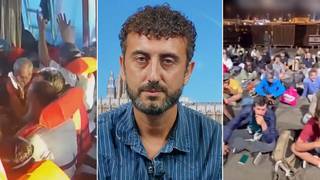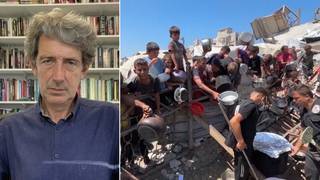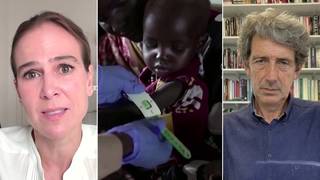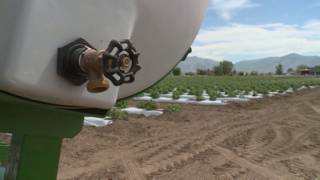
We go to Nuku’alofa, capital of Tonga, to speak with Tongan journalist Marian Kupu on the humanitarian relief efforts underway after an undersea volcano erupted on January 14, blanketing the South Pacific island nation with ash and triggering a tsunami. Kupu was able to flee the worst effects of the initial eruption by driving to higher ground but now reports lingering aftereffects such as water tanks polluted by ash. Although the islands have prepared for hurricanes, climate change has exacerbated a newly volatile environment. “We have never been prepared for volcanic eruptions,” says Kupu. “This is something really new for us.”
Transcript
AMY GOODMAN: Humanitarian aid flights are continuing to arrive in the Pacific island of Tonga after a massive undersea volcanic eruption blanketed the South Pacific island nation with ash, destroyed homes and triggered huge tsunami waves. At least three people died after the January 15 blast. Shock waves from the eruption were felt around the world. Scientists at NASA say the blast was hundreds of times stronger than the U.S. atomic bomb dropped on Hiroshima in 1945.
Tonga is made up of about 170 islands. It’s located about 2,000 miles east of Australia. Communication is still cut off for some of the 36 islands where people live. An undersea telecommunications cable connecting Tonga to the rest of the world was severed by the blast. The island nation is now in dire need of food and clean water. This is Drew Havea, vice president of the Tonga Red Cross.
DREW HAVEA: Dust in Nuku’alofa is a huge problem. People are still struggling to clean their homes, struggling to clean the roof of their houses. So, everybody is — even the unaffected areas by the tsunami are all affected by the ash.
AMY GOODMAN: We go now to the capital of Tonga, the city of Nuku’alofa, where we’re joined by Marian Kupu, a reporter for Broadcom Broadcasting.
Marian, we’re so relieved to be able to speak with you. Can you describe what took place? Describe the extent of the volcano.
MARIAN KUPU: Thank you. I don’t know how I can describe or compare what we experienced, what we’ve seen, what we felt on the 15th of January, that was Saturday. It was a very — it was a very new experience, very scary experience, that I know we will never forget — the panicking, the queuing, the confusion that the people had because we do not know or have experience or know what to do after that, during the explosion, during the tsunami and after the tsunami, with the rocks, the ashes and the thunder, and also to learn that some of the islands have been fully destroyed.
AMY GOODMAN: Can you describe what happened to you and your family? Describe January 15th, what you were doing, what you heard and saw.
MARIAN KUPU: We were at home as usual. Saturday is cleaning day for Tongan people, and it’s a day for the Tongan people to get ready for Sunday, because Sunday is taboo for shops to open. Sunday is just church service and staying home, having a feast. So, basically, we were just at home getting everything ready and just laying back.
And then, around after 5:00, that’s when we first heard the first bang. The first thing that I can really recall was my ears ringing. It was very new. Everything else just — it was just like — all I can remember was just trying — because we were very, very much aware that it is the volcano, because since last year we’ve been seeing lightning from there. We’ve been seeing clouds in the sky, just weird clouds, colors in the sky. It would be pinkish. It was just being very new for us here in the islands to witness this.
So, I think it is a good thing that we’ve had experience of witnessing that there is and know that there is a volcano that is very active down at the west side of Tonga, or the main island also, that as soon as the blast went on, the first blast went on, we knew exactly what to do, and we knew that there is a volcano. All we can think of is just running away from the sea, because where — my village is close to the main island and is also close, but not too close, to the shoreline of where the waves came. All we did was just to drive away from Nuku’alofa, drive away from the shore.
AMY GOODMAN: And then describe the impact, and on the islands, and what you even understand at this point, more than a week later, with the only internet line cut with the volcano going off.
MARIAN KUPU: Thinking back, around I’m not too sure if it was Wednesday or Thursday, we experienced — we woke up in the morning and smelled this very distinctive smell. It was not a nice smell. This is — I’m not sure if it was Wednesday or Thursday morning. All of the country can smell that. And we — finally, throughout the day, we can make up and thought it came from the volcano. So, these are the things that we now have experienced and we can now know, if we treat the volcano now that it is active, right? So, if a smell comes today, definitely we will be ready for another volcanic eruption in two or three days to come. So these are the signs that we have looked back and thought of it, and just it makes sense to what we have experienced.
With the connection or the fiber-optic — fiber cable is down because it’s laid on the seashore under the seabed, which cater all the internet connection with us here in Tonga. However, here in Broadcom we were able to connect with the rest of the world. We were practically one of the public or private companies that ever started connecting firsthand to connect with the world, besides the embassies here, because we were using our satellite. And our satellite carriers is from the Kasafic satellite company. That’s how we were able. In the meantime, there is limited access to internet. We are working together with the Tonga Corporation Communication, which is called TCC, and a local-owned phone company —
AMY GOODMAN: Can you talk about the —
MARIAN KUPU: — which is —
AMY GOODMAN: Marian, can you talk about the effect of the ash on the water supply? And what kind of international aid are you getting? What do you need?
MARIAN KUPU: The whole country, and I mean in the whole country or island, is covered with ash. From the highest building to the lowest, it’s covered with ash. So, all our water tanks — the majority of our water tanks in private homes, we gather our water from rainwater. That’s our everyday drinking water, which is safe water, nice, clear, clean water. However, when ashes came, and it just — it has polluted our tank, and is now advised not to take. However, we are very fortunate to have aid coming on our shore. They’re coming on our shore. They’re also coming in our ports — water supplies, clothing, food, and also tents for temporary shelter for those that have lost their homes.
AMY GOODMAN: According to the IMF just two years ago, Tonga is one of the world’s most exposed countries to climate change and natural disasters, suffered the highest loss from natural disasters in 2018, is among the top five over the last decade. Can you talk about volcanoes and climate change?
MARIAN KUPU: Every year in Tonga, we are expecting a natural disaster. Our most — our hurricane season is from January to March, or even can extend. So, every year we will be expecting a tropical cyclone. We have experienced tropical cyclones for years, and we have overcome them, and we are always prepared for hurricane seasons with tropical cyclones.
But we have never been prepared for a volcanic eruption. Here in the mainland, we will hear stories. Tonga is not even — Tonga, the mainland, is not even a volcanic island. The furthest island of Tonga from here is Niuas, Niuas. The Niuas are closer to Samoa than here to us here in the mainland. Those two islands are the volcanic islands. And we’ve been hearing stories coming from them from eruption, but never here in the mainland. And this is something really new for us.
AMY GOODMAN: And what about, finally, the issue of international aid and COVID, in this era of COVID?
MARIAN KUPU: We treat all cargos coming in, all the supplies or anything that lands on our country the way we treat when we have supplies for COVID, which is we do not accept or offload passengers. Only cargos are allowed to come out from the planes, and they are taken to a quarantine place for three days before we are allowed to use them or distribute them. This is also — applies to our ships coming in. They’re offloaded and are kept in a secured designated place for quarantine for three days before we can actually use them. We do not accept, or we — we still follow the COVID, because we still have to be cautious that there is COVID around in the world. I can brag that we have only had one big positive case here so far. But since the COVID-19, we have never had a serious COVID problem here in Tonga.
AMY GOODMAN: And in this last 30 seconds, Marian Kupu, as you speak to us from Tonga, I think it’s our first broadcast from Tonga, though we’ve interviewed people from Tonga when it comes to the climate crisis. What is your message to the world?
MARIAN KUPU: We’ll be expecting — I don’t think this will be the last disaster or natural disaster that Tonga will be experiencing. Every year after year we will be having natural disasters. And year after year we’ll be expecting aid to come for us, because we cannot control nature. But this is what we have to live for and live with, and this is normal for us here in the island.
AMY GOODMAN: Marian Kupu, reporter for Broadcom Broadcasting in the capital of Tonga, Nuku’alofa.
Next up, Saturday marked the 49th anniversary of Roe v. Wade, the Supreme Court decision legalizing abortion. Many question if the Supreme Court will strike down the landmark ruling before it turns 50. We’ll look at a new documentary at the Sundance Film Festival called The Janes about life before Roe, when a collective of women in Chicago built an underground service for women seeking an abortion. Could this be what post-Roe looks like, as well? Stay with us.












Media Options